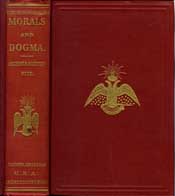 I am a year into my Masonic journey, and I have finally started working my way through Albert Pike's Morals and Dogma in earnest. I think even the most seasoned Masonic scholar will admit this is far from an easy read. Every page--indeed, almost every paragraph--practically demands thoughtful reflection to digest the genius that is Pike's view of Freemasonry.
I am a year into my Masonic journey, and I have finally started working my way through Albert Pike's Morals and Dogma in earnest. I think even the most seasoned Masonic scholar will admit this is far from an easy read. Every page--indeed, almost every paragraph--practically demands thoughtful reflection to digest the genius that is Pike's view of Freemasonry.As I progress through this tome of Pike's, I will be posting from time to time small excerpts--what I'm calling "tidbits"--which I think are of particular interest to modern Masons seeking to gain a deeper understanding of the fraternity to which they belong. The first tidbit is from the chapter on the Second Degree of Masonry, that of Fellowcraft:
Knowledge is convertible into power, and axioms into rules of unity and duty. But knowledge itself is not Power. Wisdom is Power; and her Prime Minister is Justice, which is the perfected law of Truth. The purpose, therefore, of Education and Science is to make a man wise. If knowledge does not make him so, it is wasted, like water poured on the sands. To know the formulas of Masonry, is of as little value, by itself, as to know so many words and sentences in some barbarous African or Australasian dialect. To know even the meaning of the symbols, is but little, unless that adds to our wisdom, and also to our charity, which is to justice like one hemisphere of the brain to the other.
Do not lose sight, then, of the true object of your studies in Masonry. It is to add to your estate of wisdom, and not merely to your knowledge. A man may spend a lifetime in studying a single specialty of knowledge,--botany, conchology, or entomology, for instance,--in committing to memory names derived from the Greek, and classifying and reclassifying; and yet be no wiser than when he began. It is the great truths as to all that most concerns a man, as to his rights, interest, and duties, that Masonry seeks to teach her Initiates.
And what of these "great truths" that Masonry seeks to teach its members?
Truths are the springs from which duties flow; and it is but a few hundred years since a new Truth began to be distinctly seen; that MAN IS SUPREME OVER INSTITUTIONS, AND NOT THEY OVER HIM. Man has natural empire over all institutions. They are for him, according to his development; not he for them. This seems to us a very simple statement, one to which all men, everywhere, ought to assent. But once it was a great new Truth,--not revealed until governments ahad been in existence for at least five thousand years. Once revealed, it imposed new duties on men. Man owed it to himself to be free. He owed it to his country to seek or give her freedom, or maintain her in that possession. It made Tyranny and Usurpation the enemies of the Human Race. it created a general outlawry of Despots and Despotisms, temporal and spiritual. The sphere of Duty was immensely enlarged. Patriotism had, henceforth, a new and wider meaning: Free Government, Free Thought, Free Conscience, Free Speech! All these came to be inalienable rights, which those who had parted with them or been robbed of them, or whose ancestors had lost them, had the right summarily to retake.
And how does Masonry, by adding to the "estate of wisdom" of its members, ensure that these great Truths are not lost?
The wiser a man becomes, the less will he be inclined to submit tamely to the imposition of fetters or a yoke, on his conscience or his person. For, by increase of wisdom he not only better knows his rights, but the more highly values them, and is more conscious of his worth and dignity. His pride then urges him to assert his independence. He becomes better able to assert it also; and better able to assist others or his country, when they or she stake all, even existence, upon the same assertion.






1 comment:
Morals and Dogma is a wonderful endeavor in more light. I got a copy of Bros. Miller, Chaput, Goodell, and Main's contemporary interpretation "Morals & Dogma for the 21st Century" to help me in my progress with Pike's original work. Their work parallels the pages found in Pike's original work. It can be found at: http://www.morals-and-dogma.com/index.html
S&F,
Jay
Post a Comment